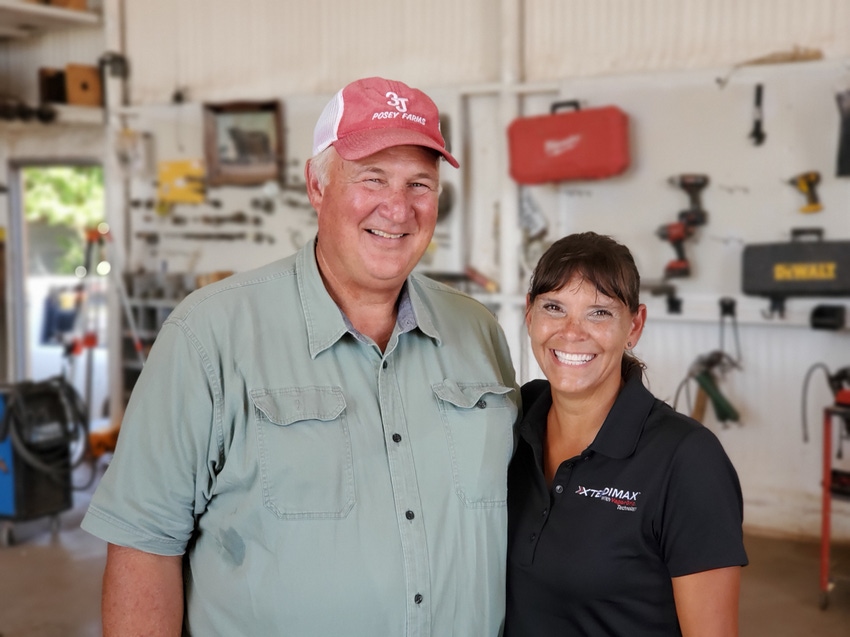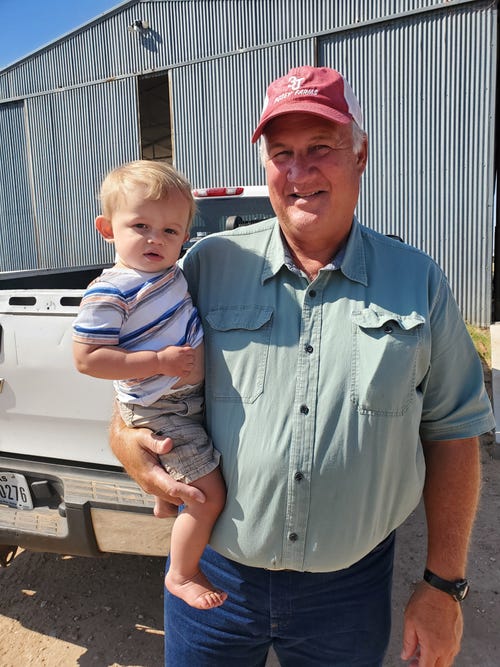
Five years ago, The Cotton Board Chairman David Grant contacted a dryland cotton farmer from Roby, Texas, to ask if he'd consider being nominated to serve on the board's officer rotation. Jeff Posey said yes and was elected.
Little did he know in 2015, what his chairmanship would behold in 2020.
"If David had told me then that once I got to be chair that my first meeting in Nashville would include a tornado; a COVID virus would shut down all the meetings; and that cotton prices would plummet because of COVID and tariffs with China, I probably would have declined," Posey said laughing.
"Chairmanship in 2019/2020 has been interesting, to say the least."
THE COTTON BOARD
The Cotton Board is the oversight and administrative arm of the Cotton Research & Promotion Program. "It is of vital interest to everyone in the cotton industry," Posey said.
"Research and promotion is about moving cotton. The more cotton moved through the supply chain, the more profit. So, keeping that program rolling, even through the struggles of the COVID virus, has been a challenge. But it's been done."
Though his term resembles a sprint hurdle race — facing one challenge after another — Posey said it also revealed the strength of his team. "We've got a good staff on The Cotton Board. The employees have been great, and we've worked through these challenges."
TEXAS ROLLING PLAINS
He understands challenges. Farming on the Texas Rolling Plains, where irrigation is, at best, supplemental and timely rainfall an anomaly, Posey's familiar with obstacles. He farms about 7,000 acres of primarily dryland cotton, wheat and experimental corn and runs Angus cattle, with his wife Phiny and their sons, Stuart and Joe and their families.
But between shallow wells (30 to 40-feet deep), salty irrigation water, and rain that for the last two years came to an abrupt stop in May, cotton production has not been easy.
"From January to May 1, we had a year's worth of rain," Posey said of 2020, standing in one of his drip-irrigated cotton fields. "We had a wet spring and one of the best wheat crop averages we've ever had, averaging about 40 bushels an acre, all dryland. On one farm we made 70 bushels, unheard of in Fisher County."
Since then, the rain stopped. "This part of the Rolling Plains can produce high yields if we get rains. In 2007, the county average was three bales to the acre on dryland. In 2011, it was a zero. So, we can go from one extreme to the other.
"It challenges the finances. It seems like we have a lot more dry years than we do wet."
In 2015, Posey and his sons reorganized and formed 3J Posey Farms. Rather than farm independently, they farm together and share equipment. They finance equipment purchases rather than pay with loans. Crop diversification has helped as well.
"On the Cotton Board, I talk about the expense of farming. When we discuss research, how can we get farming not to be as expensive?"
SEED SIZE
One area they've researched is seed size. A seed's vigor is influenced by the size of the seed, Posey explained.
"The seed companies have increased yield and fiber quality, which also comes out of cotton research. But to increase yield, the seed size got small and it was a real issue," he said.
"It used to be said that you can't have quality fiber and high yields. Well, that was proven wrong. And then it was said, you can't have good fiber and good yields with a big seed. We're starting to see seed varieties that are bigger and more vigorous."
SYNTHETICS
The market tug-of-war between man-made synthetics and cotton is another ongoing concern. "Synthetic fibers are always a challenge," Posey said, adding that China's cotton tariffs also weigh heavy on the industry.
"Cotton producers face many obstacles. But in the background, we have people like the National Cotton Council (NCC) working for the political side and Cotton Incorporated working on the fiber research and promotion side.
See, Texas Rolling Plains cotton crop described as mixed bag
"Many cotton producers don't realize how many people are working behind the scenes on their behalf. Getting involved with these organizations is a great way to learn how they work for us."
SUSTAINABILITY
Promoting cotton's sustainability through the U.S. Cotton Trust Protocol is another Research and Promotion Program and NCC initiative. "The consumer wants to know that cotton is produced sustainably," Posey said. "Producers have always been concerned about the land. We want to increase profit. But we want to do it in a way that we're leaving the land to our children and our grandchildren better than we received it."
 (Jeff Posey holds his one-year-old grandson Maddox Posey.)
(Jeff Posey holds his one-year-old grandson Maddox Posey.)
Sustainability doesn't stop at the turn row, but extends throughout the cotton supply chain down to the retail store, Posey said. "You want sustainable marketing practices and production practices. You want things environmentally friendly. God gave us this land to take care of, so we've got to take care of it."
VIRTUAL COTTON BOARD
Throughout the pandemic, The Cotton Board has followed suit converting in-person meetings and its annual conference to virtual events. The Poseys said the hardest part about serving during a quarantine is not seeing cotton industry friends face-to-face.
"That's what I've missed," Phiny said.
"One of the greatest things about being on The Cotton Board and in various cotton programs is meeting producers from across the U.S., from one coast to the other," Posey said.
The Cotton Board also works with importers. "I have met many great importers with a lot of knowledge that we, as producers on the turn row, would never have. They're sharing their knowledge with us and we're sharing our knowledge from the turn row that as a corporate person they wouldn't have.
"It's a wonderful blend of people from all parts of the United States working together for the promotion and research of cotton."
PASSING THE TORCH
As Posey prepares to pass the torch to incoming Chairman Jimmy Webb of Leary, Georgia, he cites The Cotton Board's response to the COVID-19 pandemic as his most significant accomplishment. "We're moving forward but working to ensure that everything that can be done to improve the research and promotion of cotton is being done. We haven't quit."
To view a video interview with the Poseys, click here.
About the Author(s)
You May Also Like






